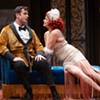Published March 4, 2015 at 10:00 a.m.
The elegant structure of Proof lures the audience into a series of small misconceptions and then shatters each of them to great effect. The Essex Community Players have mounted this smart, funny contemporary drama about four people exploring their ability to trust each other. David Auburn won a Pulitzer Prize for the play in 2001.
Its backdrop is the mathematics department at the University of Chicago. Robert, a brilliant mathematician, made major contributions to the field in his mid-twenties, but his days of teaching and theorizing ended when he went "bughouse," as he describes himself. The story is set on the back porch of his house near the university.
Robert's elder daughter, Claire, turned her relatively prosaic math abilities into a career as a Wall Street currency analyst. Catherine, his second daughter, showed intellectual promise but gave up her own academic studies to care for him. His mental illness took the form of delusions that prompted him to fill a stack of notebooks with meaningless scribbles.
The story is told with flashbacks, with the present-tense scenes set around the time of Robert's funeral. After his death, one of his graduate students wants to scrutinize the writings in case Robert's last work contains one final breakthrough. Hal methodically examines each page for the sake of science, and as an excuse to be near enough to flirt with Catherine.
Like Robert, both Catherine and Hal have a precarious hold on their intellectual abilities; the passage of time or the threat of mental illness could rob them of their power. Catherine is smart but given to lethargy bordering on depression. She's 25, right at the dividing line between prodigy and washout. Will she display her father's mathematical brilliance, or his mental instability? Hal, 28 and with no significant breakthroughs to his credit, knows he's past the age at which great mathematicians peak. And Robert's career provides a cautionary tale.
The mathematical proof referred to in the title becomes a puzzle not merely of numbers but of creativity itself. The play's structure is designed to surprise the audience with scenes that progressively reveal the characters while propelling a plot with an edge of mystery.
Though last Friday's audience wasn't quick to laugh, the play is extremely funny, and each character has a particular style of wit. Catherine's clever remarks are based on a relentless literalism, which is humorous but also shows her to be a problem solver at heart. When know-it-all Claire chirpily recommends a conditioner for "healthy hair," Catherine replies, deadpan, "Hair is dead. You can't make it healthy." Dispensing with niceties, Catherine cuts to the truth. Her ability to see clearly would serve her well as a mathematician but is less useful to her as a sister, daughter or girlfriend, the social roles in which this play tests her.
All the relationships present questions of trust. Romantic sparks or not, Catherine and Hal pause at the delicate transition between getting to know each other and actually trusting. By giving each character a reason to doubt the other, the play keenly expresses the courage it takes to love and trust.
Community theaters rarely tackle plays this sophisticated, and the Essex Players make an earnest effort. Director Eric R. Hill works largely on the surface of the characters, focusing his actors on the text more than the subtext. The result is a story delivered without all the possible nuances, but with plot and humor intact.
Kristin Silverman has some very nice moments as Catherine, confident enough of her character to stay silent and listen to the advice, flirtation and comfort the other characters direct at her. She finds all the sarcasm in Catherine's lines, sometimes trying to top the tone with an unnecessary grimace but always hitting the core of intelligence that drives Catherine's humor. Silverman's cool under fire means we see less of Catherine's vulnerability, but the plot gives her enough difficulties that we care about her.
Adam Silverman plays Hal, and if his flirtation with Catherine doesn't seem gloriously awkward, perhaps it's because the two actors are married in real life. Silverman is earnest but never cloying as the nervous math geek who can't quite believe he's succeeding with Catherine even as his attraction grows. He ducks his head to show his shyness, but he slowly learns to trust himself.
Richard Hibbert, playing Robert, looks both professorial and fatherly. His gentle manner shows why Catherine would give up her youth to care for him. Hibbert wisely refrains from extreme mannerisms — there's nothing that odd about this oddball, save for the nonsense he jots in notebooks offstage. Instead, the playwright focuses on the affection Robert has for his daughter, which Hibbert portrays through calm gazes at her.
As Claire, Andy Krackow exudes breezy self-confidence, but she also succeeds in conveying the guilt her high-achiever character tries to hide. When Claire tells her sister exactly what to do with her life, from putting milk in her coffee to leaving Chicago, Krackow radiates the nervous cheer of someone who is trying to keep the conversation away from topics that make her anxious.
In addition to directing, Hill designed the set, an impressive clapboard house exterior with a porch as the main playing space. The house's lines are more New England than Chicago, but the genuine wood and window details make it a rich backdrop for the realistic style of the production.
Hill's sound design includes perfectly atmospheric outdoor noises, especially bird calls, that give the setting a sense of spaciousness. Lighting design by Jeremy LaClair is simple and effective.
Math is the context but not the subject of Proof. The play includes one rather good math joke, which is fully explained, and some references to prime numbers. It's about human emotion, and no math skill is required to feel for these rich characters.
Auburn's play traces the quiet way that trust forms or dissolves. He shows how rare that quality is, defining trust as the essence of knowing another person. Catherine has delayed the transition from youth to adulthood for reasons good and bad, but the biggest of them is an inability to trust herself. In Proof, she must assemble enough courage to fulfill her promise and battle her fears about whether her own mind will betray her.
The original print version of this article was headlined "Gathering Evidence"
More By This Author
Speaking of...
-

Sweet Clover Market in Essex to Close
Feb 13, 2024 -

Last Quarter: Fall 2023 Vermont Housing News
Oct 3, 2023 -

Outdoor Gear Exchange to Downsize in Burlington, Open New Essex Storefront
Sep 28, 2023 -

Essex Resort & Spa Hires Greg Lang as Culinary Director
Apr 4, 2023 -

Potlucks and Planes: Seven Votes to Watch on Town Meeting Day
Feb 22, 2023 - More »
Comments
Comments are closed.
From 2014-2020, Seven Days allowed readers to comment on all stories posted on our website. While we've appreciated the suggestions and insights, right now Seven Days is prioritizing our core mission — producing high-quality, responsible local journalism — over moderating online debates between readers.
To criticize, correct or praise our reporting, please send us a letter to the editor or send us a tip. We’ll check it out and report the results.
Online comments may return when we have better tech tools for managing them. Thanks for reading.













































